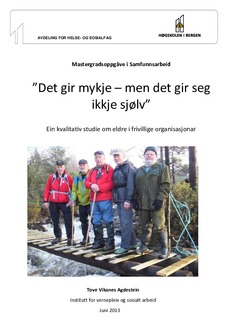| dc.contributor.author | Agdestein, Tove Vikanes | |
| dc.date.accessioned | 2018-02-01T15:07:16Z | |
| dc.date.available | 2018-02-01T15:07:16Z | |
| dc.date.issued | 2013-06 | |
| dc.identifier.uri | http://hdl.handle.net/11250/2481656 | |
| dc.description | Masteroppgave i samfunnsarbeid | |
| dc.description.abstract | Målet med studien er å undersøkje korleis deltaking i frivillige organisasjonar i Noreg påverkar dei eldre og samfunnet rundt dei. Bakgrunn er offentlege tilrådingar om å ta i bruk frivillige organisasjonar for å styrke folkehelsa og berekrafta i samfunnet, samtidig som ein ser negative utviklingstrekk i frivillige sektor. Det er lite forsking om eldre sine opplevingar knytt til deltaking i frivillige organisasjonar. Studien kan såleis vere eit nyttig bidrag til kunnskap om dei eldre sitt perspektiv. Problemstillinga i oppgåva er: Kva kan deltaking i frivillige organisasjonar bety for eldre sin livskvalitet og for lokalsamfunnet si berekraft? Problemstillinga blir utforska gjennom 4 forskingsspørsmål knytt til barrierar for deltaking og konsekvensar av deltaking på individ, gruppe og samfunnsnivå. Studien er ein kvalitativ samfunnsvitskapleg studie. Datainnsamling er gjort i fokusgruppe med eldre organisasjonsmedlemmer. Funna viser at eldre si organisasjonsdeltaking styrkar sjølvbilete og sosialt nettverk, synleggjer eldre sine ressursar og styrkjar sosial kapital, folkehelse og lokaldemokrati. Sosial utjamning i deltakinga, gode strukturelle vilkår og styrking av nivålenkande sosial kapital er strategiske område for individuell og kollektiv empowerment. Ein treng meir kunnskap om perspektiv til eldre som ikkje deltar. | en_GB |
| dc.description.abstract | The intention of the study is to examine how participation in NGOs influence old citizens and the communities they are part of. The Norwegian government claims that participation in NGOs is important for sustainability and public health. At the same time one see that there is a decrease in participation among elderly people. Little research has been done on the issue. This study might contribute to a better understanding of how old people themselves feel on this matter. The topic of the thesis is: How can participation in NGOs contribute to quality of life for the elderly, and to the sustainability of the communities they are part of? This is examined through four research questions about barriers for participation, and consequences of participation for individuals, groups and community. This is a qualitive study with data derived from focus group discussions with elderly members of organizations. The main findings are that being member of an organization improves old people’s quality of life by strengthening their social network and pointing out their resources. Elderly people’s participation yields social capital and public health. It also seems to benefit local democracy. Social inequality in participation, structural strains and social capital are imortant focus for empowerment of the elderly. Further research is needed to examine the perspectives of elderly people that do not participate. | |
| dc.publisher | Bergen University College | en_GB |
| dc.subject | frivillige organisasjonar | |
| dc.subject | eldre | |
| dc.subject | empowerment | |
| dc.subject | sosial kapital | |
| dc.subject | folkehelse | |
| dc.subject | NGOs | |
| dc.subject | elderly | |
| dc.subject | samfunnsarbeid | |
| dc.subject | communitywork | |
| dc.subject | social capital | |
| dc.subject | public health | |
| dc.title | ”Det gir mykje – men det gir seg ikkje sjølv”. Ein kvalitativ studie om eldre i frivillige organisasjonar. | en_GB |
| dc.type | Master thesis | |
